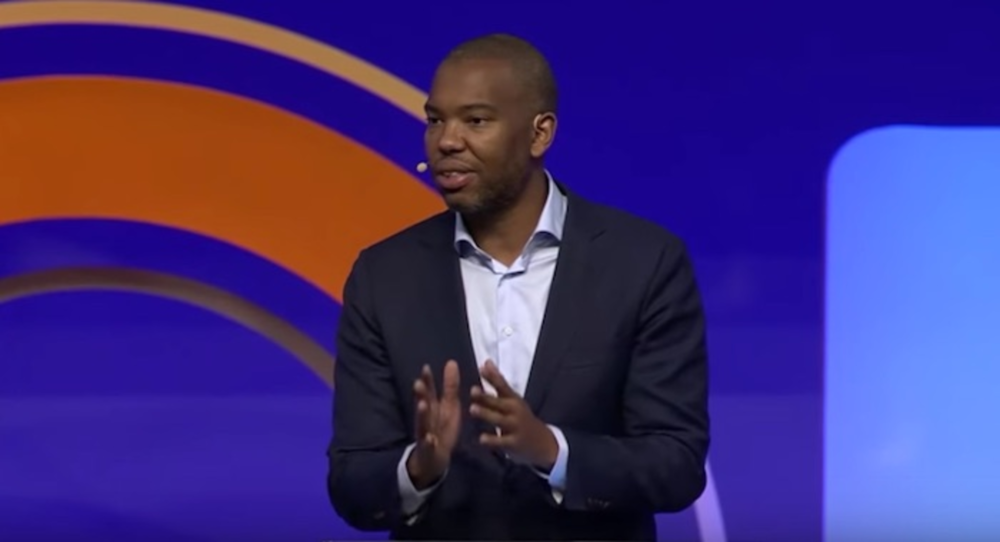Hubspot kicked off day two of its Inbound marketing conference last week with a keynote address from Ta-Nehisi Coates, the Genius grant recipient and best selling author of “Between the World and Me.” Coates, known for his eloquent compositions on America’s past and present struggles with white supremacy, predictably veered off course during his keynote, and used the platform to articulate the disappointment and trepidation many Americans are still feeling this week (most Americans, according to the current popular vote figures).
More than a few marketers in attendance didn’t respond well to the session. Enough of the audience either walked out during the speech or complained about it on social media that Hubspot felt compelled to post an apology of sorts to the Inbound event’s Facebook page.
The resounding criticism was that Coates was unprofessional. So the argument went: these people paid (or more likely, had their companies pay) hundreds of dollars to attend the star-studded event in Boston to talk about marketing; they didn’t come for a political diatribe. But that’s all anyone was seemingly talking about.
Last Wednesday, President-elect Trump was the only thing to discuss. For Coates, it wouldn’t have been professional or appropriate to avoid this topic. It would have been disingenuous. Neither Hubspot nor Ta-Nehisi Coates owes anyone an apology for that speech.
The company should have expected Coates’ to address the election. What did anyone who attended Inbound, let alone that particular keynote, expect for Coates to talk about? He’s not going to be talking about marketing technology scant hours after learning that Trump will be his president for the next four years.
If HubSpot, or any of Inbound’s attendants wanted a political safe zone at the conference they were doomed to disappointment the moment Inbound’s events team stacked the guests roster with individuals like Coates, Serena Williams, Reshma Saujani, and Alec Baldwin.
Let alone the politics of the election. Trump’s campaign itself produced a number of new normalizations with which all in the business and marketing community will have to grapple. Most pressing is the triumph of confirmation bias and the spread of disinformation online. This is not going away.
Yesterday, a top story on Google was a fraudulent WordPress blog that clearly reversed the number of popular votes for both candidates to make it seem like Trump won the popular vote, the effects of which are still spreading throughout Twitter.
In addition, people will need to talk, just as I’m sure Mr. Coates and the majority of people commenting on the above Facebook post needed to discuss the new state of the union. There was nothing unprofessional about it, not unless we’re conflating the definition of professionalism with other terms like neglect, naivety, ignorance, indifference, disrespect, dispassion, or apathy.
Being professional does not entail or endorse wholesale cognitive dissonance from reality. It is a matter of skill, tact, conduct, and good judgment. It is not the amorphous social construct many of us use to avoid pain outside the comfort of our couch. Professionalism is a means to navigate social interactions at the workplace, not a barrier between work and everything else. Marketers, perhaps more than any other professionals on the planet, have a vested interest in the interests of their audiences. You need a finger on the pulse of the people at all times. You cannot effectively sell to people you know nothing about. Right now, the thing to know is that people are thinking about the election. People are upset about the election.
The marketing software company did well booking the likes of Coates, Reshma Saujani, Alec Baldwin, and Serena Williams — and expecting such outspoken individuals to stick to the script on the day after the country selected its next president was unrealistic, whether the victor was Trump or not. Those who walked out or complained about the speech are exactly the people who needed the grounded perspective Coates gave. The marketing industry as a whole needs it.
To be clear, marketing conferences and other places of business don’t need to become political rallies. But they shouldn’t be havens for dissonance either. That so many embrace divorced disinterest in their pursuit of professionalism is part of why the industry was caught so flat-footed by the empowered digital consumer. It’s part of the reason many marketers are so out of touch with coveted millennial consumers. It’s part of the reason so many are dazed and confused by the outcome of this week’s voting.
Your office, boardroom, or conference hall is not some spectral plane existing parallel to the real, felt world, and businesses can no longer operate under this pretense. Professionals are too often expected to suppress their humanity in service of a sterile work environment. For some industries that approach is effective and appropriate. But for any person or company in the business of communicating with people, this legalistic, tone-deaf conduct is alienating. In the face of either real or “perceived” tragedy, it’s infuriating.
It doesn’t take much. Coates’ speech lasted less than 30 minutes. Long enough to address the brazen, bloviating elephant in the room — whose election will drive the cultural tone of our nation for the foreseeable future — but not so long that it co-opted the week-long event about business.








